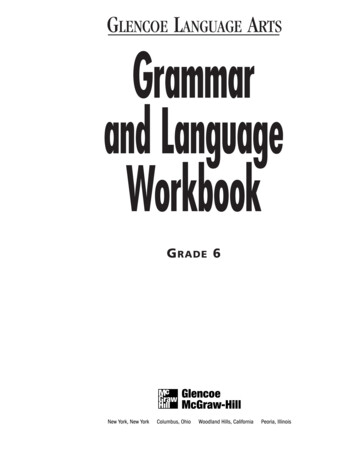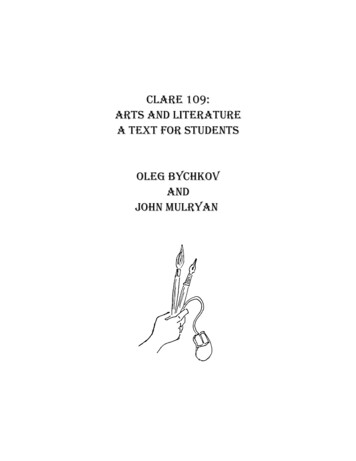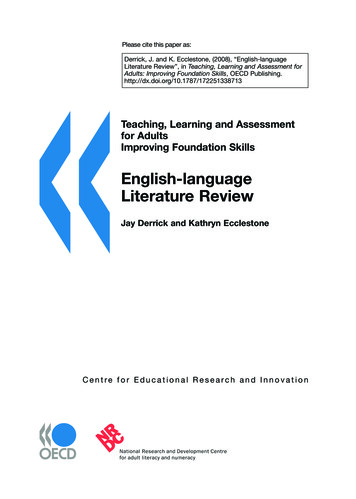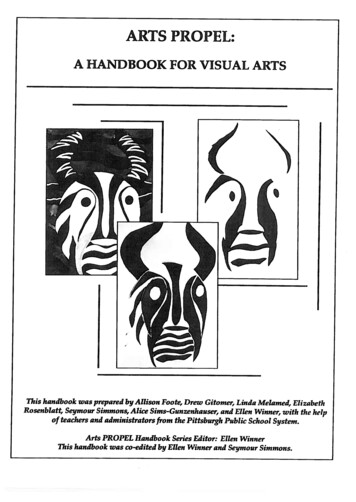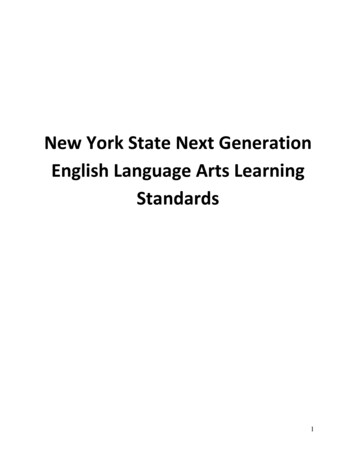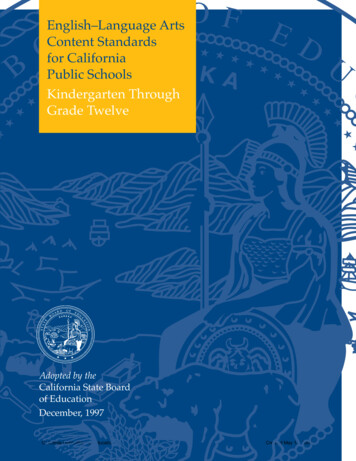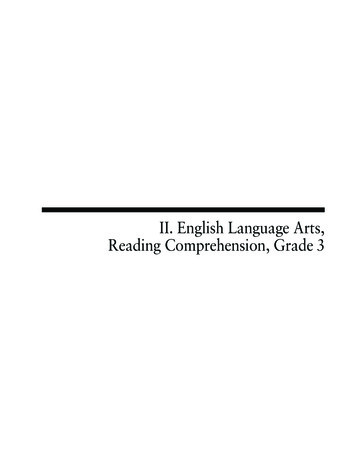
Transcription
Language Arts Literature Textbook8th GradeMr. Sparks1
Table of ContentsShort Stories1. 2BRO2B by Kurt Vonnegut .72. Charles by Shirley Jackson .133. The Lottery by Shirley Jackson 174. The Cask of Amontillado by Edgar Allan Poe .245. Young Goodman Brown by Nathaniel Hawthorne .306. A Rose for Emily by William Faulkner .387. Harrison Bergeron by Kurt Vonnegut .448. The Bet by Anton Chekov .509. The Fall of the House of Usher by Edgar Allan Poe 5510. The Sound of Thunder by Ray Bradbury .6611. The Minister’s Black Veil by Nathaniel Hawthorne .7512. The Possibility of Evil by Shirley Jackson .8313. There Will Come Soft Rains by Ray Bradbury 9014. The Tell-Tale Heart by Edgar Allan Poe .9515. The Monkey’s Paw by WW Jacobs .9916. The Veldt by Ray Bradbury 107Poetry1. Nothing Gold Can Stay by Robert Frost 1202. The Raven by Edgar Allan Poe .1253. I know why the caged bird sings by Maya Angelou .1214. Annabel Lee by Edgar Allan Poe .1245. Do Not Go Gentle Into That Good Night by Dylan Thomas .1216. All the World’s a Stage by William Shakespeare .1237. O Captain! My Captain! by Walt Whitman .1228. And Death Shall Have No Dominion by Dylan Thomas . 1209. Self-Pity DH Lawrence .12010. If you forget me by Pablo Neruda 12211. In Praise of Feeling Bad About Yourself by Wislawa Szymborska .120Dramas1. A Midsummer Night’s Dream by William Shakespeare .1292. Twelve Angry Men by Reginald Rose 187Informative Texts1. Civil Disobedience by Henry David Thoreau .2192. Letter from a Birmingham Jail by MLK Jr. .2313. Self-Reliance by Ralph Waldo Emerson .2412
Short StoriesA short story is fictional composition that ranges in length from 1,000 to 20,000 words. Edgar Allan Poe, in hisessay The Philosophy of Composition, said that a short story should be read in one sitting, anywhere from a halfhour to two hours.Because of the shorter length, a short story usually focuses on one plot, one main character with few minorcharacters. While a novel can possess numerous themes, characters, plot lines, and other such devices, short storiesgenerally rely on singular devices. Short stories also experiment with different styles and approaches, which hasmade them quite popular.Learning Objectives of Short StoriesStudents will be able to: Identify elements of plot including setting Analyze the development of plot in a narrative text Analyze a character’s personality and determine motivation Identify and differentiate between internal and external conflict Make inferences based on information provided Identify figurative language in fiction Convey proper tone in a writing piece Recognize theme within a text, citing textual support Identify examples of foreshadowing and determine author’s purpose for using them Determine author’s purpose for a specific composition.Short Story Literary Terms and Author DevicesLiterary terms and devices are elements that appear in most fiction prose, used for both style and storytelling. Asboth readers and authors it is important to understand and be able to identify them. Being able to do so will not onlyallow a better understanding of a story, but allow you the skills that you can evaluate and critique writing. The terms that are in BOLD are terms and devices that author’s use to give their writing style and meaning.The terms that are ITALICIZED are thinking skills that authors and readers use to gain understanding andmeaning of a text.Alliteration—The repetition at close intervals of initial identical consonant sounds. Or, vowel sounds in successivewords or syllables that repeat.Allusion—An indirect reference to something (usually a literary text) with which the reader is expected to befamiliar. Allusions are usually literary, historical, Biblical, or mythological.Analogy—An analogy is a comparison to a directly parallel case. When a writer uses an analogy, he or she arguesthat a claim reasonable for one case is reasonable for the analogous case.Analyze—To focuses on how plot/structure, character, setting, and many other techniques are used by the author tocreate meaning.3
Antagonist- the character in a narrative or play who is in conflict with the main character; an antagonist may noteven be a person, or may be the same person as the main character.Archetype—A term borrowed by psychologist Carl Jung who described archetypes as "primordial images" formedby repeated experiences in the lives of our ancestors, inherited in the "collective unconscious" of the human raceand expressed in myths, religion, dreams, fantasies, and literature. These "images" of character, plot pattern,symbols recur in literature and evoke profound emotional responses in the reader because they resonate with animage already existing in our unconscious mind, e.g. death, rebirth.Characterization—The method an author uses to develop characters in a work. In direct characterization, theauthor straightforwardly states the character’s traits. With indirect characterization, those traits are implied throughwhat the character says, does, how the character dresses, interacts with other characters, etc.Conflict-- The struggle between the protagonist(s) and antagonist(s). There are six kinds of conflict to be coveredthis year: Character v. Character: Two characters that oppose one anotherCharacter v. Group: A subgroup of society persecutes an individualCharacter v. Nature: The natural world opposes a characterCharacter v. Self: A character suffers from a mental opposition (i.e. illness, guilt, etc.)Character v. Society: When a society is oppressive and terroristicCharacter v. Supernatural: When the opposition is of a fantastical originConnotation—Rather than the dictionary definition, the associations associated by a word. Implied meaning ratherthan literal meaning or denotation.Deduction—A form of reasoning that begins with a generalization, then applies the generalization to a specific caseor cases.Epigraph—A quotation or aphorism at the beginning of a literary work suggestive of a theme. One found at thebeginning of John Kennedy Toole's Confederacy of Dunces: "When a true genius appears in the world, you mayknow him by this sign; that all the dunces are in a confederacy against him." —Jonathan Swift.Epiphany—A major character's moment of realization or awareness.Exposition—Background information provided by a writer to enhance a reader's understanding of the context of a fictionalor nonfictional story.Figurative Language—A word or words that are inaccurate literally, but describe by calling to mind sensations orresponses that the thing described evokes. Figurative language may be in the form of metaphors or similes, both non-literalcomparisons. Shakespeare's "All the world's a stage" is an example of non-literal figurative language (metaphorspecifically).Flat Character—A character constructed around a single idea or quality; a flat character is immediately recognizable.Foil—A character whose traits are the opposite of another and who thus points up the strengths and weaknesses of the othercharacter.Foreshadowing-- The use of hints or clues to suggest what will happen later in the story.Genre—French, a literary form or type; classification. e.g. tragedy, comedy, novel, essay, poetry.4
Hyperbole—Conscious exaggeration used to heighten effect. Not intended literally, hyperbole is often humorous.Example: "And fired the shot heard round the world."Imagery—The use of images, especially in a pattern of related images, often figurative; to create a strong unified sensoryimpression.Irony—When a reader is aware of a reality that differs from a character's perception of reality (dramatic irony)/ The literalmeaning of a writer's words may be verbal irony. Generally speaking, a discrepancy between expectation and reality.Literary Criticism-- is the study, evaluation, and interpretation of literature.Metaphor—A comparison of two things, often unrelated. Metaphors may occur: in a single sentence —"Talent is a cistern;genius is a fountain;" or can appear as a central idea of an entire work.Mood—An atmosphere created by a writer's word choice (diction) and the details selected. Syntax is also adeterminer of mood because sentence strength, length, and complexity affect pacing.Motif—A frequently recurrent character, incident, or concept in literature.Motivation-- Values, desires, and/or beliefs that cause a character to act the way that they do; Reasons why acharacter thinks, behaves, and feels a certain way.Onomatopoeia—The use of a word whose pronunciation suggests its meaning. "Buzz," "hiss," "slam," and "pop"are commonly used examples.Oxymoron—A writer’s tool that juxtaposes two contradictory terms, like "wise fool" or "deafening silence."Paradox—A seemingly contradictory statement or situation which is actually true. This device is often used foremphasis or simply to attract attention.Personification—Figurative Language in which inanimate objects, animals, ideas, or abstractions is endowed withhuman traits or human form—e.g. "When Duty whispers ”Plot—System of actions represented in a dramatic or narrative work.Point of View (POV)—The perspective from which a fictional or nonfictional story is told.a. First Person POVIn the first person point of view, the narrator does participate in the action of the story. When reading storiesin the first person, we need to realize that what thenarrator is recounting might not be the objective truth. Weshould question thetrustworthiness of the accounting.b. Third Person POVHere the narrator does not participate in the action of the story as one of the characters, but lets us knowexactly how the characters feel. We learn about the characters through this outside voice.c. OmniscientA narrator who knows everything about all the characters is all knowing, or omniscient.d. Limited OmniscientA narrator whose knowledge is limited to one character, either major or minor, has a limited omniscientpoint of view.Predicting- Using contextual clues to hypothesize a chain of events in a piece of literature.5
Protagonist—Chief character in a dramatic or narrative works, usually trying to accomplish some objective orworking toward some goal.Pun—A play on words that are identical or similar in sound but have sharply diverse meanings.Red Herring—Device through which a writer raises an irrelevant issue to draw attention away from the real issue.Round Character—A character drawn with sufficient complexity to be able to surprise the reader without losingcredibility.Satire—A work that reveals a critical attitude toward some element of human behavior by portraying it in an extremeway. Satire usually targets groups or large concepts rather than individuals; its purpose is customarily to inspirechange.Setting—Locale and period in which the action takes place.Simile—A figurative comparison of two things, often dissimilar, using the connecting words: "like," "as," or "then."E.g. "More rapid than eagles his coursers they came."Stock Character—Conventional character types that recur repeatedly in various literary genres. E.g. the wickedstepmother or Prince Charming or the rascal.Stream of Consciousness—Technique of writing that undertakes to reproduce the raw flow of consciousness, withthe perceptions, thoughts, judgments, feelings, associations, and memories presented just as they occur without beingtidied into grammatical sentences or given logical and narrative order.Symbol—A thing, event, or person that represents or stands for some idea or event. A symbol is generally a tangible(physical) object that represents an abstract (nonphysical) idea.Theme—A central idea of a work of fiction or nonfiction, revealed and developed in the course of a story or exploredthrough argument.Tone—a writer's attitude toward his or her subject matter revealed through diction, figurative language, andorganization of the sentence and global levels.Tragic Flaw—Tragic error in judgment; a mistaken act which changes the fortune of the tragic hero from happinessto misery.6
Author’s BiographyKurt Vonnegut Jr. was born on November 11, 1922, in Indianapolis, Indiana, the son of a successful architect, KurtSr., and his wife, Edith Sophia. Vonnegut was raised along with his sister, Alice, and brother Bernard (whom hespoke of frequently in his works). Fourth-generation Germans, the children were never exposed to their heritagebecause of the anti-German attitudes that had spread throughout the United States after World War I. Because ofthe Great Depression (the severe economic downturn in the 1930s), the Vonneguts lost most of their wealth and thehousehold was never the same. Vonnegut's father fell into severe depression and his mother died after overdosingon sleeping pills the night before Mother's Day. This attainment and loss of the "American Dream" would becomethe theme of many of Vonnegut's writings. His most famous writings include Slaughterhouse Five and Cat’sCradle.Pre-Reading Questions1. Does a government have the right to do whatever it can to protect its citizens?2. What is the best way to control the population growth?3. Should an individual couple have the right to have as many children as they want?Vocabulary Termsa. Keen-Intelligent; sharpb. Taut-Stretched; with tensionc. Reflectively- To consider with great thoughtd. Luminously-Quite brighte. Revolver- A pistol2BRO2BEverything was perfectly swell.There were no prisons, no slums, no insane asylums, no cripples, no poverty, no wars.All diseases were conquered. So was old age.Death, barring accidents, was an adventure for volunteers.The population of the United States was stabilized at forty-million souls.One bright morning in the Chicago Lying-in Hospital, a man named Edward K. Wehling, Jr., waited for his wife togive birth. He was the only man waiting. Not many people were born a day any more.Wehling was fifty-six, a mere stripling in a population whose average age was one hundred and twenty-nine.X-rays had revealed that his wife was going to have triplets. The children would be his first.Young Wehling was hunched in his chair, his head in his hand. He was so rumpled, so still and colorless as to bevirtually invisible. His camouflage was perfect, since the waiting room had a disorderly and demoralized air, too.Chairs and ashtrays had been moved away from the walls. The floor was paved with spattered dropcloths.The room was being redecorated. It was being redecorated as a memorial to a man who had volunteered to die.A sardonic old man, about two hundred years old, sat on a stepladder, painting a mural he did not like. Back in thedays when people aged visibly, his age would have been guessed at thirty-five or so. Aging had touched him thatmuch before the cure for aging was found.The mural he was working on depicted a very neat garden. Men and women in white, doctors and nurses, turned thesoil, planted seedlings, sprayed bugs, spread fertilizer.7
Men and women in purple uniforms pulled up weeds, cut down plants that were old and sickly, raked leaves,carried refuse to trash-burners.Never, never, never—not even in medieval Holland nor old Japan—had a garden been more formal, been bettertended. Every plant had all the loam, light, water, air and nourishment it could use.A hospital orderly came down the corridor, singing under his breath a popular song:If you don't like my kisses, honey, Here's what I will do: I'll go seea girl in purple, Kiss this sad world toodle-oo. If you don't want mylovin', Why should I take up all this space? I'll get off this oldplanet, Let some sweet baby have my place.The orderly looked in at the mural and the muralist. "Looks so real," he said, "I can practically imagine I'm standingin the middle of it.""What makes you think you're not in it?" said the painter. He gave a satiric smile. "It's called 'The Happy Garden ofLife,' you know.""That's good of Dr. Hitz," said the orderly.He was referring to one of the male figures in white, whose head was a portrait of Dr. Benjamin Hitz, the hospital'sChief Obstetrician. Hitz was a blindingly handsome man."Lot of faces still to fill in," said the orderly. He meant that the faces of many of the figures in the mural were stillblank. All blanks were to be filled with portraits of important people on either the hospital staff or from the ChicagoOffice of the Federal Bureau of Termination."Must be nice to be able to make pictures that look like something," said the orderly.The painter's face curdled with scorn. "You think I'm proud of this daub?" he said. "You think this is my idea ofwhat life really looks like?""What's your idea of what life looks like?" said the orderly.The painter gestured at a foul dropcloth. "There's a good picture of it," he said. "Frame that, and you'll have apicture a damn sight more honest than this one.""You're a gloomy old duck, aren't you?" said the orderly."Is that a crime?" said the painter.The orderly shrugged. "If you don't like it here, Grandpa—" he said, and he finished the thought with the tricktelephone number that people who didn't want to live any more were supposed to call. The zero in the telephonenumber he pronounced "naught."The number was: "2 B R 0 2 B."It was the telephone number of an institution whose fanciful sobriquets included: "Automat," "Birdland,""Cannery," "Catbox," "De-louser," "Easy-go," "Good-by, Mother," "Happy Hooligan," "Kiss-me-quick," "LuckyPierre," "Sheepdip," "Waring Blendor," "Weep-no-more" and "Why Worry?"8
"To be or not to be" was the telephone number of the municipal gas chambers of the Federal Bureau ofTermination.The painter thumbed his nose at the orderly. "When I decide it's time to go," he said, "it won't be at the Sheepdip.""A do-it-yourselfer, eh?" said the orderly. "Messy business, Grandpa. Why don't you have a little consideration forthe people who have to clean up after you?"The painter expressed with an obscenity his lack of concern for the tribulations of his survivors. "The world coulddo with a good deal more mess, if you ask me," he said.The orderly laughed and moved on.Wehling, the waiting father, mumbled something without raising his head. And then he fell silent again.A coarse, formidable woman strode into the waiting room on spike heels. Her shoes, stockings, trench coat, bag andoverseas cap were all purple, the purple the painter called "the color of grapes on Judgment Day."The medallion on her purple musette bag was the seal of the Service Division of the Federal Bureau ofTermination, an eagle perched on a turnstile.The woman had a lot of facial hair—an unmistakable mustache, in fact. A curious thing about gas-chamberhostesses was that, no matter how lovely and feminine they were when recruited, they all sprouted mustacheswithin five years or so."Is this where I'm supposed to come?" she said to the painter."A lot would depend on what your business was," he said. "You aren't about to have a baby, are you?""They told me I was supposed to pose for some picture," she said. "My name's Leora Duncan." She waited."And you dunk people," he said."What?" she said."Skip it," he said."That sure is a beautiful picture," she said. "Looks just like heaven or something.""Or something," said the painter. He took a list of names from his smock pocket. "Duncan, Duncan, Duncan," hesaid, scanning the list. "Yes—here you are. You're entitled to be immortalized. See any faceless body here you'dlike me to stick your head on? We've got a few choice ones left."She studied the mural bleakly. "Gee," she said, "they're all the same to me. I don't know anything about art.""A body's a body, eh?" he said, "All righty. As a master of fine art, I recommend this body here." He indicated afaceless figure of a woman who was carrying dried stalks to a trash-burner."Well," said Leora Duncan, "that's more the disposal people, isn't it? I mean, I'm in service. I don't do anydisposing."The painter clapped his hands in mock delight. "You say you don't know anything about art, and then you prove inthe next breath that you know more about it than I do! Of course the sheave-carrier is wrong for a hostess! Asnipper, a pruner—that's more your line." He pointed to a figure in purple who was sawing a dead branch from anapple tree. "How about her?" he said. "You like her at all?"9
"Gosh—" she said, and she blushed and became humble—"that—that puts me right next to Dr. Hitz.""That upsets you?" he said."Good gravy, no!" she said. "It's—it's just such an honor.""Ah, You admire him, eh?" he said."Who doesn't admire him?" she said, worshiping the portrait of Hitz. It was the portrait of a tanned, white-haired,omnipotent Zeus, two hundred and forty years old. "Who doesn't admire him?" she said again. "He was responsiblefor setting up the very first gas chamber in Chicago.""Nothing would please me more," said the painter, "than to put you next to him for all time. Sawing off a limb—that strikes you as appropriate?""That is kind of like what I do," she said. She was demure about what she did. What she did was make peoplecomfortable while she killed them.And, while Leora Duncan was posing for her portrait, into the waiting room bounded Dr. Hitz himself. He wasseven feet tall, and he boomed with importance, accomplishments, and the joy of living."Well, Miss Duncan! Miss Duncan!" he said, and he made a joke. "What are you doing here?" he said. "This isn'twhere the people leave. This is where they come in!""We're going to be in the same picture together," she said shyly."Good!" said Dr. Hitz heartily. "And, say, isn't that some picture?""I sure am honored to be in it with you," she said."Let me tell you," he said, "I'm honored to be in it with you. Without women like you, this wonderful world we'vegot wouldn't be possible."He saluted her and moved toward the door that led to the delivery rooms. "Guess what was just born," he said."I can't," she said."Triplets!" he said."Triplets!" she said. She was exclaiming over the legal implications of triplets.The law said that no newborn child could survive unless the parents of the child could find someone who wouldvolunteer to die. Triplets, if they were all to live, called for three volunteers."Do the parents have three volunteers?" said Leora Duncan."Last I heard," said Dr. Hitz, "they had one, and were trying to scrape another two up.""I don't think they made it," she said. "Nobody made three appointments with us. Nothing but singles going throughtoday, unless somebody called in after I left. What's the name?""Wehling," said the waiting father, sitting up, red-eyed and frowzy. "Edward K. Wehling, Jr., is the name of thehappy father-to-be."He raised his right hand, looked at a spot on the wall, gave a hoarsely wretched chuckle. "Present," he said."Oh, Mr. Wehling," said Dr. Hitz, "I didn't see you.""The invisible man," said Wehling.10
"They just phoned me that your triplets have been born," said Dr. Hitz. "They're all fine, and so is the mother. I'mon my way in to see them now.""Hooray," said Wehling emptily."You don't sound very happy," said Dr. Hitz."What man in my shoes wouldn't be happy?" said Wehling. He gestured with his hands to symbolize care-freesimplicity. "All I have to do is pick out which one of the triplets is going to live, then deliver my maternalgrandfather to the Happy Hooligan, and come back here with a receipt."Dr. Hitz became rather severe with Wehling, towered over him. "You don't believe in population control, Mr.Wehling?" he said."I think it's perfectly keen," said Wehling tautly."Would you like to go back to the good old days, when the population of the Earth was twenty billion—about tobecome forty billion, then eighty billion, then one hundred and sixty billion? Do you know what a drupelet is, Mr.Wehling?" said Hitz."Nope," said Wehling sulkily."A drupelet, Mr. Wehling, is one of the little knobs, one of the little pulpy grains of a blackberry," said Dr. Hitz."Without population control, human beings would now be packed on this surface of this old planet like drupelets ona blackberry! Think of it!"Wehling continued to stare at the same spot on the wall."In the year 2000," said Dr. Hitz, "before scientists stepped in and laid down the law, there wasn't even enoughdrinking water to go around, and nothing to eat but sea-weed—and still people insisted on their right to reproducelike jackrabbits. And their right, if possible, to live forever.""I want those kids," said Wehling quietly. "I want all three of them.""Of course you do," said Dr. Hitz. "That's only human.""I don't want my grandfather to die, either," said Wehling."Nobody's really happy about taking a close relative to the Catbox," said Dr. Hitz gently, sympathetically."I wish people wouldn't call it that," said Leora Duncan."What?" said Dr. Hitz."I wish people wouldn't call it 'the Catbox,' and things like that," she said. "It gives people the wrong impression.""You're absolutely right," said Dr. Hitz. "Forgive me." He corrected himself, gave the municipal gas chambers theirofficial title, a title no one ever used in conversation. "I should have said, 'Ethical Suicide Studios,'" he said."That sounds so much better," said Leora Duncan."This child of yours—whichever one you decide to keep, Mr. Wehling," said Dr. Hitz. "He or she is going to liveon a happy, roomy, clean, rich planet, thanks to population control. In a garden like that mural there." He shook hishead. "Two centuries ago, when I was a young man, it was a hell that nobody thought could last another twentyyears. Now centuries of peace and plenty stretch before us as far as the imagination cares to travel."11
He smiled luminously.The smile faded as he saw that Wehling had just drawn a revolver.Wehling shot Dr. Hitz dead. "There's room for one—a great big one," he said.And then he shot Leora Duncan. "It's only death," he said to her as she fell. "There! Room for two."And then he shot himself, making room for all three of his children.Nobody came running. Nobody, seemingly, heard the shots.The painter sat on the top of his stepladder, looking down reflectively on the sorry scene.The painter pondered the mournful puzzle of life demanding to be born and, once born, demanding to be fruitful .to multiply and to live as long as possible—to do all that on a very small planet that would have to last forever.All the answers that the painter could think of were grim. Even grimmer, surely, than a Catbox, a Happy Hooligan,an Easy Go. He thought of war. He thought of plague. He thought of starvation.He knew that he would never paint again. He let his paintbrush fall to the drop-cloths below. And then he decidedhe had had about enough of life in the Happy Garden of Life, too, and he came slowly down from the ladder.He took Wehling's pistol, really intending to shoot himself.But he didn't have the nerve.And then he saw the telephone booth in the corner of the room. He went to it, dialed the well-remembered number:"2 B R 0 2 B.""Federal Bureau of Termination," said the very warm voice of a hostess."How soon could I get an appointment?" he asked, speaking very carefully."We could probably fit you in late this afternoon, sir," she said. "It might even be earlier, if we get a cancellation.""All right," said the painter, "fit me in, if you please." And he gave her his name, spelling it out."Thank you, sir," said the hostess. "Your city thanks you; your country thanks you; your planet thanks you. But thedeepest thanks of all is from future generations."Discussion & Composition QuestionsComprehension Questions1. What was the method of population control stated in the short story?2. What is the situation that Wheling, Jr. is enduring in the story?3. What is Wheling’s ultimate course of action at the end of the story?Analysis Questions4. What do you believe is the painter’s opinion of the world he lives in? What evidence do you have to support this?5. What historical “garden” is the painter mimicking in the mural? Why is this ironic?6. What are the moral implications (what could be the long term bad consequences) of having a society like that inthe story?Connection Questions7. Could you ever envision that USA having a society like that in the story?8. If you were in Wheling’s position, what would you have done at the end of the story?12
Author’s BiographyShirley Jackson was born on December 14, 1916 in San Francisco, California. She went on to become a short storywriter whose work ran in magazines like Redbook and The New Yorker, which first published "The Lottery." Thehighly controversial and famous tale featured a village that took part in an annual death ritual. Jackson also wrotenovels like The Haunting of Hill House and We Have Always Lived in the Castle as well as the witty, embellishedmemoir Life Among the Savages, about her domestic experiences. Often relying on supernatural themes, she wasknown for tackling provocative, chilling subject matter that was culturally incisive and held metaphors for howpeople dealt with difference. Her view on human nature and civilization was often bleak but she used these views tocompose socially relevant and telling stories that have both thrilled and horrified readers.Pre-Reading Questions1. Is childhood a time of innocence and purity?2. Can you ever know a person’s true personality?VocabularyRenounceTo reject or disown.ElaboratelyWorked out with great care and nicety of detail.SimultaneouslyOccurring at the same time.Incr
Figurative Language—A word or words that are inaccurate literally, but describe by calling to mind sensations or responses that the thing described evokes. Figurative language may be in the form of metaphors or similes, both non-literal comparisons. Shakespeare's "All the world's a stage" is an example of n


